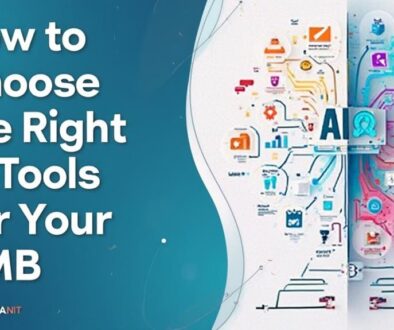Unlocking the Benefits of AI for SMBs
Artificial intelligence (AI) has emerged as a game-changer in the business world, offering immense potential for small and medium-sized businesses (SMBs). AI is the simulation of human intelligence in machines that are programmed to think, learn, and problem-solve like humans. This transformative technology holds great promise for SMBs, enabling them to streamline operations, enhance decision-making processes, and improve customer experiences.
One of the key benefits of AI for SMBs is automation and efficiency improvement. By leveraging AI-powered tools and systems, small businesses can automate repetitive tasks and processes requiring significant time and effort. This frees up valuable resources and allows employees to focus on more strategic and value-adding activities. For instance, AI-enabled chatbots can handle customer inquiries around the clock, reducing the need for manual intervention and ensuring prompt responses. This level of automation improves operational efficiency and enhances customer satisfaction by providing instant support.
Cost reduction and resource optimization are other significant advantages that AI brings to SMBs. Implementing AI technology can help small businesses optimize resource allocation by accurately predicting demand patterns, identifying cost-saving opportunities, and minimizing wastage. For example, AI-powered inventory management systems can analyze historical sales data and external factors such as weather conditions or holidays to forecast demand accurately. This enables SMBs to maintain optimal stock levels, avoid overstocking or understocking situations, and ultimately reduce costs associated with inventory management.
Personalized customer experiences have become crucial to business success in today’s competitive landscape. AI empowers SMBs to deliver tailored experiences by analyzing vast customer data collected from various touchpoints. With this valuable insight, businesses can create highly personalized marketing campaigns that resonate with individual customers’ preferences and needs. Additionally, AI-driven recommendation engines enable SMBs to offer relevant product suggestions based on customers’ browsing history or purchase behavior. These personalized interactions enhance customer satisfaction, foster loyalty, and drive repeat business.
In addition to these direct benefits, AI also levels the playing field for SMBs by providing access to advanced technology that was previously only available to large enterprises. This democratization of AI allows small businesses to compete on a more equal footing with their bigger counterparts. By harnessing AI capabilities, SMBs can gain valuable insights, automate processes, and deliver exceptional customer experiences without extensive resources or infrastructure.
Automation and Efficiency Improvement
Artificial intelligence (AI) technology has revolutionized how businesses operate, offering numerous benefits for small and medium-sized enterprises (SMBs). One of the critical advantages that AI brings to SMBs is automation and efficiency improvement. By streamlining repetitive tasks and enhancing operational efficiency, AI enables SMBs to optimize their processes, save time, and reduce costs.
Streamlining repetitive tasks
One of the primary ways AI can benefit SMBs is by streamlining repetitive tasks. Many businesses have manual processes that are time-consuming and prone to errors. AI technology can automate these processes, allowing employees to focus on more strategic and value-added activities. For example, in customer service departments, AI-powered chatbots can handle routine customer inquiries, freeing up human agents to address more complex issues. This not only improves response times but also reduces the workload on staff members.
Furthermore, AI can be used to automate data entry and analysis tasks. Instead of manually inputting data into spreadsheets or databases, AI algorithms can automatically extract information from various sources and populate the required fields. This not only saves time but also minimizes the risk of human error. Additionally, AI algorithms can analyze large volumes of data quickly and accurately, providing valuable insights for decision-making.
Enhancing operational efficiency
In addition to streamlining repetitive tasks, AI technology can enhance operational efficiency within SMBs. Businesses can optimize resource allocation and workflow management by leveraging machine learning algorithms. For instance, in manufacturing industries where production schedules are critical, AI algorithms can analyze historical data and real-time inputs to predict demand patterns accurately. This allows businesses to adjust their production plans accordingly, minimizing waste and maximizing productivity.
AI can also improve supply chain management by optimizing inventory levels based on demand forecasts. By analyzing historical sales data and external factors such as weather patterns or economic indicators, AI algorithms can recommend optimal stock levels for each SKU product. This prevents overstocking or stockouts, reducing carrying costs and improving customer satisfaction.
Furthermore, AI-powered systems can monitor equipment performance in real time and predict maintenance needs. AI algorithms can identify patterns that indicate potential failures or breakdowns by analyzing sensor data and historical maintenance records. This enables SMBs to schedule preventive maintenance activities proactively, minimizing downtime and costly repairs.
Cost Reduction and Resource Optimization
Small businesses always seek ways to cut costs and optimize their resources. With the advent of AI technology, these goals have become more attainable than ever. By leveraging AI tools and algorithms, small businesses can identify cost-saving opportunities and optimize resource allocation, leading to significant financial benefits.
Identifying cost-saving opportunities
One of the critical advantages of AI technology is its ability to analyze vast amounts of data quickly and accurately. This enables small businesses to identify cost-saving measures that may have gone unnoticed. For example, AI algorithms can analyze purchasing patterns and supplier data to identify areas where costs can be reduced. By automating this process, small businesses can save time and resources that would have been spent on manual analysis.
Real-life examples demonstrate how businesses have benefited from AI-driven cost reduction. Take the case of a small manufacturing company that used AI-powered predictive analytics to optimize its inventory management. By analyzing historical sales data, customer demand patterns, and market trends, the company could accurately forecast demand for each product. As a result, they reduced excess inventory levels while ensuring they had enough stock to meet customer demands. This optimization led to a significant reduction in carrying costs and improved cash flow for the business.
Optimizing resource allocation
In addition to identifying cost-saving opportunities, AI technology can help small businesses optimize resource allocation. AI algorithms can provide insights into how resources should be allocated for maximum efficiency by analyzing factors such as employee productivity, customer demand, and market trends.
For instance, a retail business can use AI-powered workforce management tools to determine optimal staffing levels based on historical sales data and foot traffic patterns. By accurately forecasting demand fluctuations throughout the day or week, the business can schedule employees accordingly, avoiding overstaffing during slow periods and understaffing during peak hours. This not only improves operational efficiency but also helps reduce labor costs.
Resource optimization is particularly beneficial for small businesses with limited resources. By leveraging AI technology, they can make informed decisions on allocating their resources effectively, ensuring they are used as efficiently and cost-effectively as possible.
Personalized Customer Experiences
With the advancements in AI technology, small businesses now have the opportunity to provide personalized customer experiences like never before. AI can enhance customer experiences by tailoring products and services to meet individual needs. By analyzing vast customer data, AI algorithms can identify patterns and preferences, allowing businesses to offer personalized recommendations. For example, an online clothing retailer can use AI to suggest items based on a customer’s previous purchases or browsing history. This level of personalization improves customer satisfaction and increases the likelihood of repeat purchases and brand loyalty.
In addition to tailoring products and services, AI can play a crucial role in improving customer support. AI-powered chatbots and virtual assistants are becoming increasingly common in the business world. These intelligent systems can handle customer inquiries, provide information, and even resolve issues without human intervention. For instance, a small e-commerce business can deploy a chatbot on its website that uses natural language processing to understand customer queries and deliver accurate responses in real time. This saves time for both customers and businesses and ensures consistent and efficient support around the clock.
The advantages of using AI in customer support go beyond just efficiency. These systems can learn from interactions with customers over time, allowing them to improve their responses and problem-solving capabilities continuously. They become better equipped to address specific needs effectively as they gather more data about customers’ preferences and pain points. Moreover, AI-powered chatbots can simultaneously handle multiple conversations, ensuring no customer is left waiting for assistance.
By leveraging AI technology for personalized customer experiences, small businesses can level the playing field with larger competitors who traditionally have more resources. With automation, efficiency improvement, and cost reduction, as discussed earlier in this blog post, implementing AI solutions can significantly impact SMBs’ bottom line while delivering exceptional service to their customers.
Leveling the Playing Field
In today’s competitive business landscape, small and medium-sized businesses (SMBs) often find themselves at a disadvantage compared to giant corporations. Limited resources, budget constraints, and a lack of access to cutting-edge technologies can make it challenging for SMBs to stay ahead. However, with the advent of artificial intelligence (AI), SMBs can level the playing field and compete on an equal footing.
Competing with larger businesses
One of the critical advantages that AI brings to SMBs is the ability to compete with larger businesses. Traditionally, big corporations have had an edge over smaller players due to their financial muscle and extensive resources. However, AI technology has democratized access to powerful tools that were once only available to large enterprises.
AI enables SMBs to automate various processes across different departments, from sales and marketing to customer service and operations. By automating repetitive tasks, SMBs can free up valuable time and resources that can be redirected toward strategic initiatives. This allows them to operate more efficiently and effectively without requiring a large workforce or extensive manual labor.
To illustrate this point, let’s consider a case study of a small e-commerce business competing against an industry giant. The e-commerce business utilizes AI-powered chatbots to handle customer inquiries in real time. These chatbots have natural language processing capabilities to understand customer queries and provide relevant responses.
By leveraging AI chatbots, the e-commerce business can provide prompt customer support 24/7 without needing an extensive customer service team. In contrast, the industry giant relies on traditional call centers staffed by numerous agents. The use of AI technology not only saves costs for the e-commerce business but also ensures that customers receive quick and accurate assistance.
Accessible AI solutions for SMBs
While AI technology may seem daunting at first glance, there are now accessible solutions specifically designed for SMBs. Many AI tools and platforms have been developed with user-friendliness and affordability in mind, making them suitable for small businesses with limited technical expertise.
For instance, cloud-based AI platforms allow SMBs to access powerful AI capabilities without requiring extensive hardware or software investments. These platforms provide pre-built models and APIs that can be easily integrated into existing systems, enabling SMBs to leverage AI without starting from scratch.
Additionally, AI-powered software applications are tailored to specific industries and business functions. These applications often come with intuitive interfaces and require minimal setup or configuration. SMBs can choose from various options, such as AI-powered customer relationship management (CRM) systems, inventory management tools, or predictive analytics solutions.
To implement AI effectively, SMBs should start by identifying areas within their operations where AI can make the most impact. This could involve automating repetitive tasks, analyzing large datasets for actionable insights, or enhancing customer experiences through personalized recommendations. By focusing on specific use cases and partnering with reliable AI vendors or consultants, SMBs can ensure a smooth transition to an AI-driven business model.
FAQs
-
What is AI technology? AI, or artificial intelligence, is the simulation of human intelligence in machines programmed to think and learn like humans. It involves the development of computer systems capable of performing tasks that would typically require human intelligence, such as speech recognition, problem-solving, and decision-making.
-
How can small businesses benefit from AI technology? Small businesses can benefit from AI technology in several ways. Firstly, it enables automation and efficiency improvement by streamlining repetitive tasks and freeing up valuable time for employees to focus on more strategic activities. Secondly, it helps reduce costs and optimize resources by identifying areas of inefficiency and suggesting cost-saving measures. Lastly, it allows for personalized customer experiences by analyzing customer data and tailoring products or services based on individual preferences.
-
Is AI only suitable for large corporations? No, AI is not exclusive to large corporations. Small businesses can also leverage AI technology to gain a competitive edge in the market. With advancements in technology and increased accessibility to AI tools and platforms, small businesses have the opportunity to harness the power of AI for their benefit.
-
Are there any risks associated with implementing AI in small businesses? While there are potential risks related to implementing AI in small businesses, proper planning and implementation can mitigate these risks. Some common concerns include data privacy and security issues, job displacement due to automation, and the need for skilled personnel to manage AI systems. However, these risks can be minimized with careful consideration and adherence to best practices.
-
How do I get started with implementing AI in my small business? To implement AI in your small business, it is essential first to identify areas where AI can bring the most value. This could be automating repetitive tasks or improving customer service through personalized recommendations. Next, research available tools or consult with experts specializing in AI implementation for small businesses. Finally, create an implementation plan, considering budget, resources, and training needs. By taking these steps, you can begin harnessing the benefits of AI technology in your small business.
-
How does AI personalize customer experiences? AI uses algorithms to analyze customer data and identify patterns, allowing businesses to offer personalized recommendations and tailor products/services to meet individual needs.
-
What are the benefits of personalized customer experiences? Personalized experiences improve customer satisfaction, increase brand loyalty, and lead to higher chances of repeat purchases.
-
How can AI improve customer support? AI-powered chatbots and virtual assistants can handle customer inquiries, provide information, and resolve issues efficiently without human intervention.
-
Can AI-powered chatbots learn from interactions with customers? Yes, AI-powered chatbots can learn from customer interactions over time, improving their responses and problem-solving capabilities.
-
How can small businesses compete with larger competitors using AI? Implementing AI technology allows small businesses to automate processes, reduce costs, and deliver exceptional service, leveling the playing field with larger competitors.





Boost Your SMB Marketing With AI: 6 Tips - AlexCasteleiro.com
October 24, 2023 @ 7:29 am
[…] ways to elevate their marketing strategies and gain an edge over their competitors. Enter the power of artificial intelligence (AI). By harnessing the capabilities of SMB Marketing With AI, businesses can unlock many opportunities […]